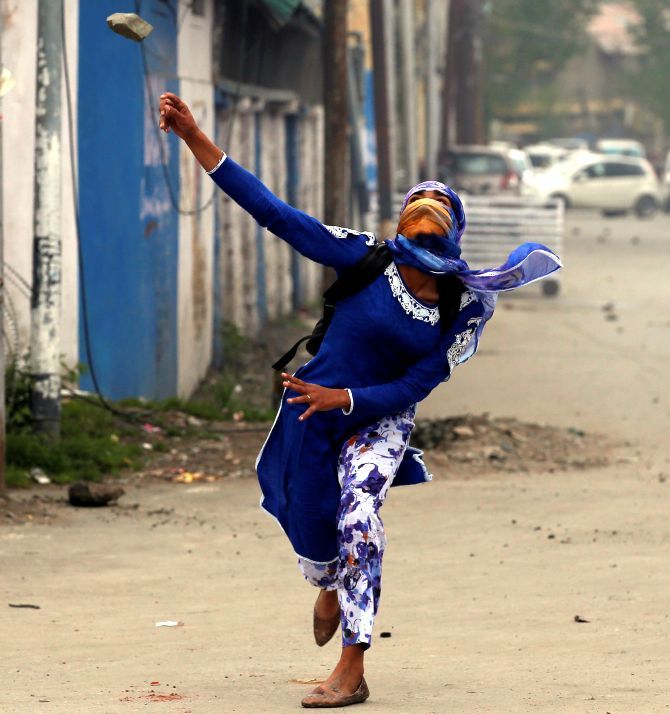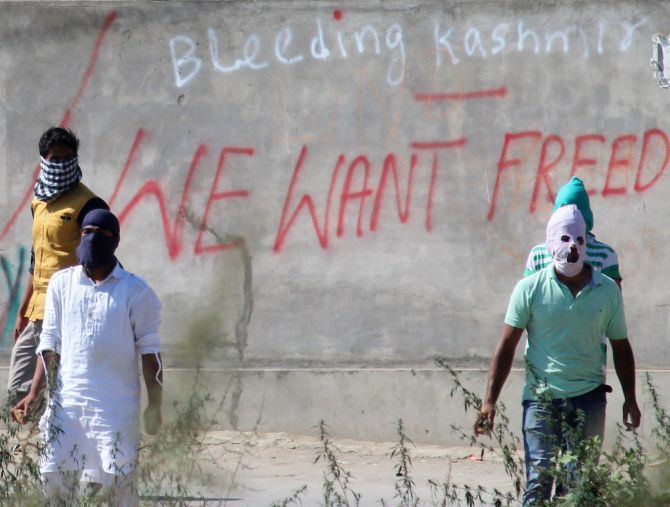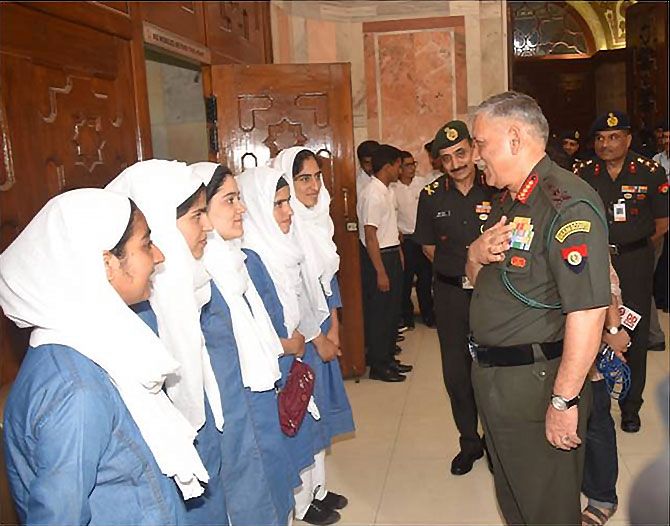'Their redemption is here. Definitely not in Pakistan.'
'They know if they step 20 steps on the other side of the Line of Control they will never return.'
'They will be ill treated.'

What do Kashmiri stone pelters mean when they shout 'Azaadi'?
What do the Kashmiris want?
What are the factors destablising the Kashmir valley? What are the solutions?
Did the September 28, 2016 surgical strikes serve their purpose?
Is peace possible in Kashmir?
As Northern Army Commander, Lieutenant General K T Parnaik was the man in charge of defending the Line of Control, supervising the security and anti-terrorist operations in Jammu and Kashmir and guarding the China border.
Currently, the Joint Managing Director, Defence and Security, Rolta India, the retired general discusses these issues with Rediff.com's Archana Masih.
- Part 1 of the Interview: 'The separatists have to be made irrelevant'
- Part 2 of the Interview: 'If the velvet glove comes off, the iron fist will show'
How do you assess the situation in the Kashmir valley today?
There are 4, 5 influencing factors that are destablising the valley.
If we segregate them and handle them individually, then collectively we can bring the situation under control.
It has to have the cooperation and coordination of all the agencies -- the army, paramilitary, security agencies, administration, political and central leaders.
But there should be guidelines -- do not appease, don't give additional laxity on law and order, hold officials accountable and fourth, make people part of the development process.
Give them ownership. Villagers should be made responsible to monitor and report on progress and quality of infrastructure in their villages.
When you make people accountable, they become responsible.
The youth has to be lured with education, sports, adventure and meaningful activity.
Now, even girls have started throwing stones.
They are being forced.
In a crowd many do it because others are doing so.
I don't believe these stone pelters are hard core radicals.
Those who instigate them will never be in the forefront.
What we did was to have video camera crews wherever stone throwing incidents happened.
We got shots of the ring leaders. The clips were brought to the police station, the stone pelters were identified and called along with the parents.
They were asked if they had indulged in stone pelting or not, if they said no -- the video feed was shown to them.
There are many good ways without touching, hurting or abusing anybody.
Perception management is central to the whole strategy in J&K.
You can't wish away the ISI, the terrorists who come to die. They will keep coming.
For Pakistan, J&K is an obsession.
Do you think there is a greater problem today in the streets of Kashmir than at the Line of Control?
The LoC is a very big area of concern. You cannot put your guard down there at all.
Because you are alert and aggressive, the LoC will remain under your control.
But in the streets and villages are your own people, you can't shoot them.
You have a separate strategy to deal with them. There has to be a preventive strategy and responsive strategy.
I'll give you an example of Afzal Guru's hanging.
When we were informed by the home ministry late in the night that this is going to happen in the morning, we realised that it will be a problem.
I had a word with my commanders, DG Police, security agencies and we started getting into positions.
Section 144 was imposed. When the information came in, the mosques were blaring and people were trying to come out and they were not allowed.
Major problems happen when people from neighbouring areas start thronging into the cities.
It was a sensitive issue because the the family wasn't told and the body was not handed over, so the administration, the CM were very apprehensive, but we had taken preemptive measures.
For 15 days we monitored and controlled it strictly.
There were incidents, but nothing like what is happening today.
If you pre-empt things, you could save the situation.
If you don't, then the situation is out of your hands.
The army cannot do a police job.
We cannot wield lathis and fire pellet guns.
We can fire our rifles if we have to, but it can't be fired at a crowd -- there will be mayhem -- so there are a lot of restrictions.
So comparing the situation at the LoC to the situation on the streets is an uneven comparison.
Comparing the two is not a seemingly comparison because that dynamics is different.
In terms of attention, yes, what is happening inside the valley on the streets catches the eye of everybody.
Pakistan always wants to keep J&K at the centre of controversy and chaos.
By instigating people to come out on the streets, 1000s of photographs get uploaded and the world sees it.
They (Pakistan) take sadistic pleasure in saying what the Indian Army and the government is doing, but if there were 20 groups trying to infiltrate the LoC who would know?
The media is not going to the LoC, so it is difficult to compare.
In terms of attention, yes, the internal situation always gets more attention.
The moment there is success in perception management and a calm summer they itch about what next?
What prevented us from disciplining the separatists?
If a common man goes to the Pakistan embassy, he would be hauled up and asked 20 questions, but they (the separatists) go openly.
What are we trying to say? That we are a great democracy we allow people to do anything? Is that the aim?
If they (the separatists) are rabid anti-nationals, there is no reason why they should be given any space. Their passports should be impounded.
As part of perception management, videos can be uploaded to show how their children are living and where they are studying.
The government doesn't want to do this, but there is a lot of merit in exposing these people.

Hasn't the situation in Kashmir taken a turn for the worse?
How many times have you heard in your own profession since you joined that 'Kashmir toh gaya (We have lost Kashmir)'.
Today also, 50% TV panelists are saying that.
Let me say with the fullest conviction that Kashmir kahi nahin ja raha hai (Kashmir is here to stay).
It will be impossible for anybody to take Kashmir from us.
Whatever may be the local instigation or radicalisation, we are well entrenched and understand what is happening.
It is just those vacant spaces when you let your guard down on governance, law and order etc -- if any one of these arms lays down its guard, there will be problems.
Unless we find a permanent solution, these are recurring problems.
What are the permanent solutions?
- I say it simply as a soldier can -- Cut the umbilical cord with Pakistan.
- 2. Make the state government accountable for everything the Centre provides.
- 3. Ensure funding is permanently choked -- through hawala or the money Saudi Arabia sends madarsas that are not registered yet.
- 4. Control the environment through perception management. Changing hearts and minds will require a motivated and dedicated perception management strategy at the national level.
It has to be done without beating your drums without debates and panel discussions. - 5. The government has to have a plan A, B, C to execute.
- 6. Engage the youth.
Kashmiris are fence sitters. They have one leg this side and one leg that side.
They quickly put down their leg on the side which they see is winning, so we have to win -- and we have to be seen to be winning.
How do we win?
You win when you cut that umbilical cord with Pakistan and lessen that influence.
- Register unregistered madarsas and bring them under the rules.
Choke the funding.
You know who is funding them and where the funding is going.
We are not blind to it. - Perception management is a big method to tackle radicalisation.
- Insuring that communication is controlled, but not cut off.
- Bring Kashmiris into the mainstream.
It is felt the Kashmiris are going farther and farther away from the rest of India.
The Kashmiris are going nowhere.
Their redemption is here. Definitely not in Pakistan.
They also know that if they step 20 steps on the other side of the Line of Control they will never return.
They will be ill treated. They will be treated like labourers and menials.

26 boys and two girls cracked the IIT-JEE mains examination.
Photograph: Northern Command/Twitter
You said in a previous interview that the idea of secession needs to change to an idea of integrity. But that is not happening.
What is central to this is the minds of the people -- that they don't get misled by the rhetoric around them.
They are attention seekers. They want Article 370, special privileges, dual citizenship.
The fear of being marginalised keeps them aggressive.
They want recognition, but are hesitant to be recognised as Indians, so they find the middle path and say 'azaadi chahiye'.
Leave us alone, let us be ourselves.
Other than the separatists and radicals, the rest of the Kashmiris don't openly say they want to join Pakistan.
Theoretically, let us assume the hypothetical situation that Kashmir becomes like Switzerland.
They neither have the wherewithal, infrastructure or money.
They have hydel power, but not the engineers.
They have hospitals, but not the doctors.
They need a country to help them. Otherwise, there is no survival.
Have the surgical strikes against Pakistan served their purpose?
Surgical strikes are retaliatory methods.
Under normal circumstances as is our ethos, we have no ambition to capture areas across the border.
That doesn't mean they can keep coming, beheading our people and insulting us.
Retribution should be against the Pakistani forces that are helping, aiding and abetting this.
We are a professional force. The time comes when there is need to show them what we can do it professionally.
A surgical strike goes to prove that point.
I come back to the point of managing the LoC.
You are dealing with an adversary like Pakistan, who uses canon fodder, sending in armed people to fight us.
They don't care if these people die.
Nobody retrieves their bodies, and hands them to their families.
No media in Pakistan reports that a militant has been killed and that the family hasn't got the body. Have you ever heard this?
Surgical strikes will have to be launched now and then again.
It is not as if one strike will quieten them for the rest of the year.
They are also a professional army. They know if they want to create trouble for us, they will choose some place on the huge border.
Similarly, we can also create trouble for them.
Do you think the situation in J&K is grim?
I wouldn't say that. The situation is cyclic.
As of now it appears to be worrisome, but it is nothing we should be so scared about.
We will deal with it. We need to hold ourselves.
All the arms (of the government) need to come together and work in synergy, especially in the summer when infiltration steps up, when schools are closed and the youth are free.
The more attention they get, the more excited they will get.
I think the government knows what to do, the army also knows what to do.
We are careful about not being heavy handed. If we are careful, it takes a little more time to bring things under control.
There are many indirect methods and that is where an innovative commander will use his head.
For a military mind, it is manageable.











 © 2025
© 2025